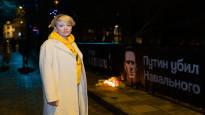VILNA The Russian opposition has started to discuss To Alexei Navalny after death about whether to start resisting the regime with weapons.
This is what the coordinator of the Open Russia opposition movement says Anastasia Shevchenko. He lives in Vilnius, the capital of Lithuania, which has become one of the centers of the Russian opposition in exile.
– I am no longer ready to turn the other cheek. I am not ready to endure the torture, imprisonment or murder of my friends, Ševčenko says in an interview with .
Shevchenko says he could carry weapons himself in armed protests.
– I would not have thought that I would end up here in my life. But I don’t know any other ways to fight terrorists.
Shevchenko refers to the president as terrorists Vladimir Putin to the administration.
Activist: Navalny’s death has sparked resistance
Until now, the opposition demanding Russian democracy has acted non-violently, although the regime’s grip has become increasingly brutal.
In Shevchenko’s thinking, the non-violent movement has led nowhere.
Demonstrations have been banned, the opposition leaders who remained in Russia are languishing in prison and the rest have fled abroad. There are very few legal ways to oppose the regime.
However, according to Shevchenko, Navalny’s death in prison has reawakened civil society in Russia.
People have been taking flowers to memorials to the victims of persecution across Russia, despite being arrested. Thousands of people turned out for Navalny’s funeral in Moscow on Friday.
– We want these people to continue to take to the streets, because sometimes you just have to stop being afraid, Shevchenko says.
At the same time, he admits that it is easy to demand courage when you are safe abroad. Shevchenko fled the country in 2022.
He has been sentenced in Russia to a four-year suspended prison sentence because he led the ex-oligarch Mikhail Khodorkovsky The local branch of the Open Russia movement in the city of Rostov.
The opposition is planning an election protest
The idea of armed resistance is not entirely new to the Russian opposition.
For example, a former Duma representative who fled to Ukraine Ilya Ponomarev has long called for Putin to be overthrown by arms. Russian troops are also fighting in the ranks of Ukraine, and there are allegedly armed resistance fighters in Russia.
Still, most of the opposition is on different lines.
Economic adviser to Navalny’s movement Vladimir Milov is still talking about a democratic change of power in Russia.
According to him, Navalny had millions of supporters in Russia who have not gone anywhere.
– They are angry with Putin for this murder, and want to avenge it. They are working even harder for a free Russia, Milov tells in Vilnius.
According to Milov, the opposition is planning a new kind of protest in connection with the show-like presidential elections in Russia.
– When Alexei Navalny was still alive, his last political appeal was for people to go to the polls on March 17 at exactly 12 o’clock.
The idea is that instead of Putin’s fake election victory, the most important news of the day would be the crowds gathered at the polling stations by the opposition.
Navalny’s supporter: Putin’s regime is weaker than people think
For now, the Putin regime’s repressive measures are keeping its opponents in Russia quiet. However, according to Milov, the administration is not as strong as it seems.
– Putin has major fundamental weaknesses, says Milov.
According to Milov, there are problems both at the front and in the economy.
Russian forces in Ukraine are worn out and tired after two years of fighting. It is becoming increasingly difficult to find new capable soldiers.
The economy is shrinking, except for the defense sector, which covers only about six percent of the national economy. The state’s monetary reserves are running out and inflation is galloping.
Russia’s recent military success in Ukraine and Navalny’s death have produced, in Milov’s opinion, an unnecessarily gloomy picture of the situation in the West and among the opposition.
– Pessimism is a gift to our enemy Putin.
When the administration starts to lose its grip, changes happen quickly, according to Milov. This is what happened to the Soviet Union, whose fall was hard to imagine even in its last years.
The opposition’s task is to speed up the administration’s difficulties as best it can.
– The time will come when we can go to the streets and demand change, says Milov.
What do you think about the chances of the Russian opposition to topple the Putin regime? Discuss topic 4.3. until 11 p.m.
